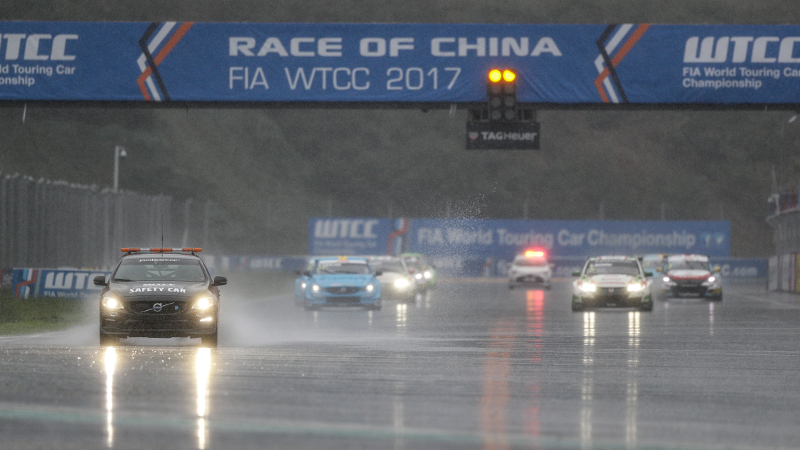Last weekend in China saw the first time in the history of the World Touring Car Championship that half-points were awarded, after the Main Race was stopped after two laps behind the safety car and not resumed.
Persistent heavy rain in the Zhejiang province of China, in which the Ningbo International Speedpark is located, meant that the entire event took place on a wet track in the rain.
Conditions worsened on Sunday, such that both races started behind the safety car. Whilst the Opening Race was able to get underway in anger on the fourth lap, with Esteban Guerrieri ultimately going on to claim a full-points win, the Main Race was affected by heavier rain and darkening conditions and was canned after just two laps behind the safety car.
Despite the fact that there were no green flag laps whatsoever, half points were awarded because more than two laps had been completed. The sporting regulations, however, make no definition about whether those two laps need to be held under green flag conditions.
The exact wording states: “if a race is suspended under Article 149, and cannot be resumed under Article 150, no points will be awarded if the leader has completed less than two laps, half points will be awarded if the leader has completed more than two laps but less than 75% of the original race distance (rounded up to the total number of laps covered) and full points will be awarded if the leader has completed more than 75% of the original race distance”.
A similar situation arose in the World Endurance Championship race at Fuji in 2013, when eight laps were run behind the safety car before a pause and another eight laps behind the safety car, after which point the race was stopped.
The same situation came into play then, as more than two laps were completed but less than 70% of the planned race distance.
It prompted a change to the rules in WEC for 2014, stating that in such circumstances no points would be awarded when no racing laps had been completed. The WEC rule amendment stated that “a minimum of two laps must have been completed by the leader outside of a safety car procedure”.
Why such an amendment never made it into the FIA WTCC sporting regulations is anyone’s guess, but its omission could have a huge impact on the drivers’ championship standings.
Of course, this is not completely unchartered territory for the WTCC. In 2014, the first race in Slovakia was stopped early due to wet weather, although full points were awarded. The second race was then completely cancelled, without even a start behind the safety car, meaning that no points were awarded. The situation in China last weekend had a very similar feel, but for the attempt to start the Main Race and hand out points.
Awarding Néstor Girolami 15 points for the race ‘win’ was tantamount to giving away 20 points for pole position on Saturday, as there were no chances for any drivers to gain a position, other than retirements.
In the championship battle, therefore, Volvo’s Thed Björk picked up 12.5 points for qualifying in third, whilst Honda’s Norbert Michelisz scooped 15.5 points for qualifying in second.
The points didn’t quite follow the qualifying results all the way down the field though, as Münnich Motorsport’s Rob Huff, who had qualified in fourth, retired from the race at the end of the first lap, dropping the Brit out of the scoring positions just before the race was called off.
Of course, if no points had been awarded then the absent Tiago Monteiro would still be leading the drivers’ championship, by nine points from Björk. Which, given that neither Björk nor Monteiro actually ‘raced’ in Round 14, would have to be the more appropriate score.
The ‘race that shouldn’t have been’ does have one interesting effect on the drivers’ championship battle, however. Three drivers – Björk, Monteiro and Michelisz – are now vying for the overall title, separated by a mere two points, with six races still to run.
It sets up the prospect of a thrilling end to the season, even if the championship table now has a feeling of being distinctly wrong about it.

